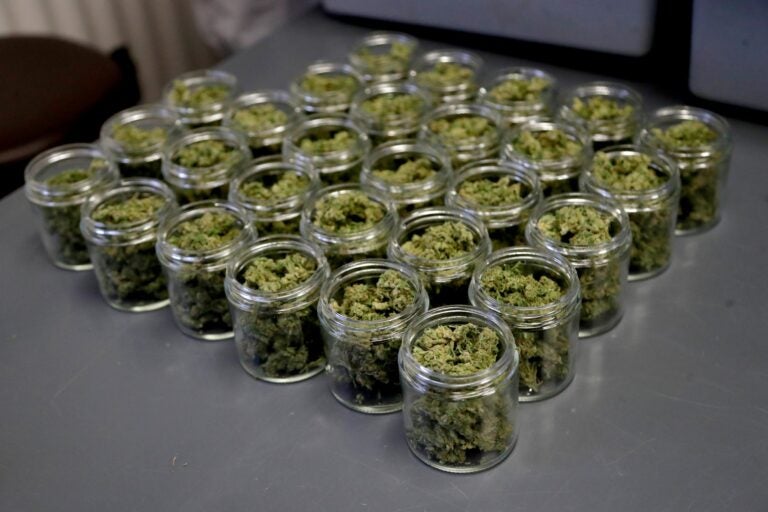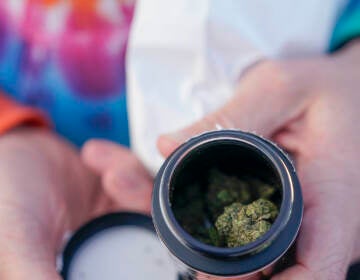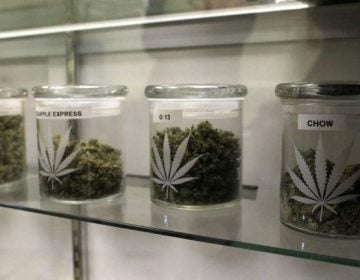Another try for recreational marijuana in Delaware
Following New Jersey’s lead, some Delaware lawmakers hope this is the year legal recreational marijuana use will finally be approved.

Marijuana buds are seen in prescription bottles as they are sorted at Compassionate Care Foundation's grow house, Friday, March 22, 2019, in Egg Harbor Township, N.J. (AP Photo/Julio Cortez)
Delaware may pride itself on being first, but supporters of legal recreational marijuana use have been frustrated watching as 15 other states and the District of Columbia have approved such legislation, including most recently New Jersey.
A 2018 bill fell four votes shy of passing the State House. A bill filed in 2019 never saw action on the House floor and fell victim to the COVID-19-shortened legislative session in 2020.
The latest effort, HB 150, was unveiled by state Rep. Ed Osienski Thursday afternoon.
“The mid-Atlantic region is moving toward legalizing marijuana, and Delaware should not be left out of this new industry,” Osienski said.
Delaware approved medical marijuana in 2011 and passed legislation decriminalizing possession of less than 1 ounce of marijuana in 2015.
“This is the next logical and reasonable step in the process,” Osienski said.
The bill would allow 30 licensed marijuana retailers to open throughout the state. They would be able to set their own prices, with a 15% tax on the sales going to the state’s general fund.
“We would be establishing a new industry that will create good-paying jobs for Delawareans while striking a blow against the marijuana illegal market,” he said.
The nearly 50-page bill has provisions to help communities that have been disproportionately affected by the state’s current marijuana laws for decades.
The bill defines a “disproportionately affected area” as a place that has high rates of arrests, conviction and incarceration relating to the sale, possession, use, cultivation, manufacture, or transport of marijuana.”
Half of the first round of licenses will be awarded to those who live in such an area or have previously been convicted of marijuana-related offenses. Those licensees would get a 40% discount on their license fees. They would also receive technical help from the state and be eligible for low-interest loans and grant funding to help grow their businesses.
“This will ensure that underserved communities that for decades have been disproportionately impacted by marijuana prohibition can benefit from legalization,” Osienski said.
Both Osienski and Sen. Trey Paradee, the bill’s prime sponsor in the State Senate, expressed confidence in the measure’s success. But Paradee has been confident before. He stood on the House floor three years ago and predicted it would pass, a prediction that has yet to come true.
“I knew that inevitably it was going to pass,” Paradee said. “I do believe that the legalization is still inevitable, and I’m hopeful that our colleagues also understand that it is inevitable.”
The bill has 14 sponsors in the House and eight in the Senate.
One person in Dover who still has reservations about legalizing marijuana is Gov. John Carney. “I don’t think it’s a good idea to be out ahead of that, [to be] one of the lead states there,” Carney told WHYY News in a 2018 interview.
When asked Thursday about the latest iteration of the bill, Carney spokesman Jon Starkey said the governor’s position hasn’t changed. “He supported decriminalization and an expansion of Delaware’s medical marijuana program, but he still has concerns about legalizing recreational marijuana,” Starkey said.
Starkey did not answer when asked whether Carney would veto the bill if it were approved.
“I’m hopeful that he’ll realize what’s going on around us and either sign this, or let it become law.” Osienski said.
“He’s said that he’s not supportive of it, but he’s never said that he would veto it,” Paradee added.
Like the previous bills, this legislation would not change driving laws related to impairment. It also would still allow employers to do drug tests on employees. The bill does not allow individuals to grow marijuana on their own.
A hearing on HB 150 is scheduled for the House’s Health & Human Development Committee on March 24.
WHYY is your source for fact-based, in-depth journalism and information. As a nonprofit organization, we rely on financial support from readers like you. Please give today.








